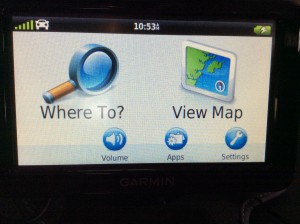I took a long road trip several weekends ago to spend time with very dear friends. As you can imagine, there was talk, walks, laughter, and tears along with a little bit of whine and a little bit of wine. It was a great time of introspection and much needed rejuvenation.
Then came the trip home. Yuck! More for company than anything else, I turned on the GPS and listened as the female voice guided my route. I should have turned it off when I was back in familiar territory, but for some perverse reason I didn’t. So for fifty miles I listened to her shouting at me to follow her commands (or so it seemed). Of course she had all the latest satellite information on distance and traffic. On the surface, her way should have been the right way. But since this was my home turf, I knew that the way she was directing me would have lots of lights. And with my luck, they would be all red. She also didn’t recognize that her way took me by a large shopping mall. It was a Sunday and of course everyone would be out shopping. She didn’t care. It would be much more relaxing for me to stay on the highway with no lights and no traffic even if it meant a few extra miles. She kept insisting on taking me the way that fit with her programmed plans.
All this annoyance got me thinking about my work in music therapy and the continuing conversations about Evidence Based Practice (EBP). What’s the connection there, you might ask? Well Siri, or that disembodied voice in the machine, is a little bit like one part of EBP – the best available research. She has empirical data to back up her choices. Our best available research has empirical data to back up recommended clinical choices.
But there are two other critical components of EBP – clinical expertise and individual differences. In my drive home, I had the expert knowledge of the local roads with information that the data would not know or measure such as a blow-out sale at the mall. In our clinical work, we have local information from our sessions that make rigid following of research protocols ineffective. One instance comes to my mind – the use of minor keys or modes for very young children with autism. Some research I have read seems to indicate that simple melodies in diatonic keys are best. Well that might have been accurate for the limited confines of the research protocol, but every week in my sessions when I sing those songs in minor I see and hear young children with autism turn their faces toward mine and begin to vocalize in a way that I had not heard before. The clinical outcomes support the validity of my clinical expertise.
Siri also could not observe or measure my individual needs on that long, long trip home. I really just wanted to keep my foot on the gas rather than the brake pedal. For me, that would make for a better quality trip than shaving seven minutes off my drive time. That’s an individual difference. There is a considerable amount of written evidence used to select a treatment plan for young children with autism (ABA, Floortime, TEEACH). I know this one little boy in particular who does not and will not respond to any demanded outcome, external reward or not. But come and watch him in a music therapy session. Given some freedom in musical expression, he not only says but sings words. And furthermore he sings them with understanding and intent. His individual differences, especially his unique response to music, are just as important as that large research study that says that kids like him should have better outcomes with an M & M or other external reward system.
So just like ignoring or talking back to Siri, we need to value our own experiences and respect the differences of our young clients and be confident in our choices as clinicians. This means knowing and understanding our best research, but also knowing and understanding our clinical effectiveness and our client’s unique strengths.
Here at Raising Harmony, we try and bring you quality research in both music therapy and early childhood. But we also appreciate your clinical skills and your intimate knowledge of your clients, your families and your communities.
Now, back to re-programming that machine!
Beth


